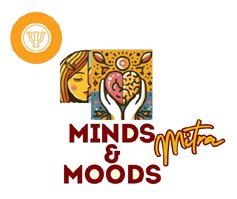Conquering the “Musts” and “Shoulds”: A Guide to Rational Emotive Behavior Therapy (REBT) 💡
Rational Emotive Behavior Therapy (REBT) is a highly proactive and structured form of psychotherapy developed by Albert Ellis. It’s built on the principle that our emotions and behaviors are not caused by external events, but by our beliefs about those events. REBT’s core tenet is that irrational beliefs—like demanding that we “must” be perfect or that others “should” treat us a certain way—are the root cause of psychological distress. A mental health counsellor or psychologist uses REBT to help clients identify these rigid, irrational beliefs and replace them with more rational, flexible ones, leading to healthier emotional responses and behaviors.
A Trusted Professional in Nagpur: Rrimi Bodalkar
For those seeking a skilled psychotherapist in Nagpur, Rrimi Bodalkar is an excellent choice. As a Sr. Mental Health Counsellor, she holds an M.A. in Psychology (Counselling) and a PGDMH (Clinical), providing her with a robust foundation in therapeutic practice. Her specialization in CBT, REBT & DBT (Specialised) demonstrates her expertise in these highly effective therapeutic modalities. She is also an NSDC Certified professional in Psychometric Analysis & Learning Style Assessment, allowing her to provide a holistic and data-driven approach to personal counselling. Rrimi Bodalkar is an experienced professional who can provide a wide range of services, from anger management counselling to career counselling and executive coaching.
Why REBT is a Game-Changer: Symptoms & Causes
People often seek Rational Emotive Behavior Therapy when they feel stuck in a cycle of negative emotions and self-defeating behaviors. The symptoms that suggest REBT may be a good fit include:
- Overwhelming Emotions: Experiencing excessive anxiety, guilt, sadness, or rage in response to a situation. This can be a sign of a mood disorder or a need for anger management counselling.
- Self-Defeating Behaviors: Procrastination, avoidance of social situations (social skills training), or using unhealthy coping mechanisms.
- Persistent Negative Thinking: A relentless habit of self-criticism or a belief that things “should” be different than they are. This is a core issue addressed by REBT.
- Relationship Conflicts: Recurring issues in relationship counselling, marriage counselling, or couple therapy that stem from unrealistic expectations of a partner.
- Burnout & Stress: Feeling workplace stress or burnout because of perfectionistic beliefs about performance.
The causes of these symptoms are tied to deeply held irrational beliefs. For example, a student struggling with school stress might have the irrational belief, “I must get a perfect grade, or I am a complete failure.” This leads to crippling anxiety. REBT helps to target these specific beliefs, which are the real cause of the distress.
The Procedure of Treatment: The A-B-C-D-E Model
The procedure of treatment in Rational Emotive Behavior Therapy is a simple but powerful five-step process known as the A-B-C-D-E model.
- A (Activating Event): The therapist helps the client identify the specific event or situation that triggered their emotional distress (e.g., getting a promotion at work).
- B (Beliefs): The client identifies their beliefs about the activating event. A psychotherapist will help them distinguish between rational beliefs (“It would be nice to do well”) and irrational beliefs (“I must be perfect in this new role, or I am a failure”).
- C (Consequences): The client identifies the emotional and behavioral consequences of their beliefs (e.g., intense anxiety, negative thinking, and difficulty sleeping).
- D (Disputing): This is the core of REBT. The therapist and client work together to actively challenge and dispute the irrational beliefs. They will use logical, empirical, and functional arguments to question the validity of the belief (e.g., “Where is the proof that you are a total failure if you make a mistake?”).
- E (Effective New Beliefs): The client replaces the irrational beliefs with new, rational, and effective ones. The new belief might be, “It would be good to do well, and if I make a mistake, I can learn from it and move on.” This leads to a healthier consequence, such as a sense of calmness and increased confidence building.
Frequently Asked Questions (FAQ’s)
Q1: How is REBT different from Cognitive Behavioral Therapy (CBT)?
A: While very similar, REBT is more directive and philosophical than standard CBT. REBT places a strong emphasis on identifying and challenging the “musts,” “shoulds,” and other demanding beliefs that cause emotional distress.
Q2: Can REBT help with depression?
A: Yes. REBT is a highly effective depression therapist tool. It helps individuals challenge the irrational beliefs that contribute to hopelessness and sadness, such as “My life is awful, and it will never get better.”
Q3: Is REBT suitable for children?
A: Yes, a child psychologist can adapt the principles of REBT to help children understand how their thoughts influence their feelings and behaviors. It’s often used as support for special needs children to help them manage their emotional responses.
Q4: Can this therapy help with public speaking anxiety?
A: Absolutely. Public speaking anxiety treatment is a perfect application of REBT. It helps individuals challenge the irrational belief, “I must be perfect, or I will be humiliated,” and replace it with a more rational perspective.
Q5: Is it possible for irrational beliefs to go away completely?
A: The goal of REBT is not to eliminate all irrational beliefs, which is often unrealistic. The goal is to make them less rigid, less pervasive, and to build the skills to dispute them as they arise, which is a key part of personality development counselling.

